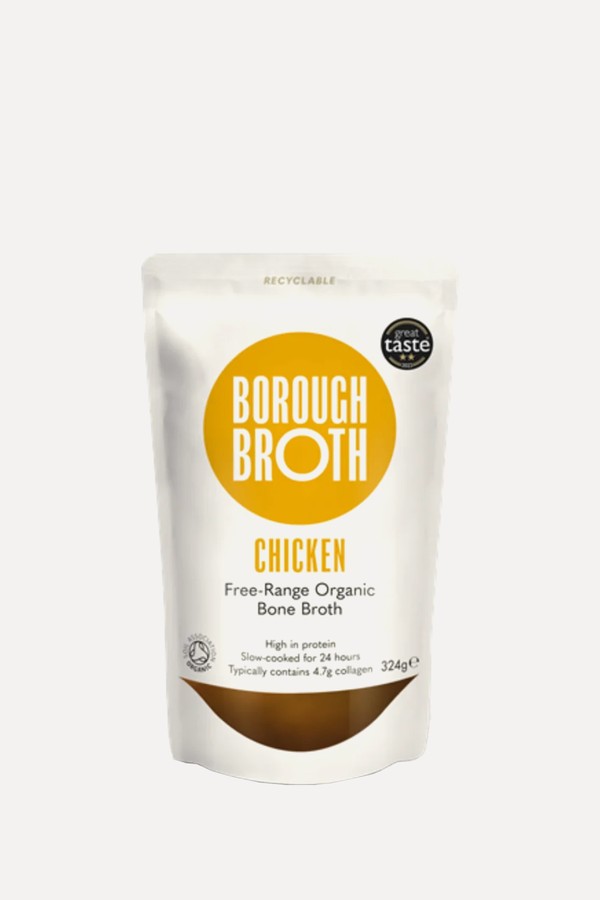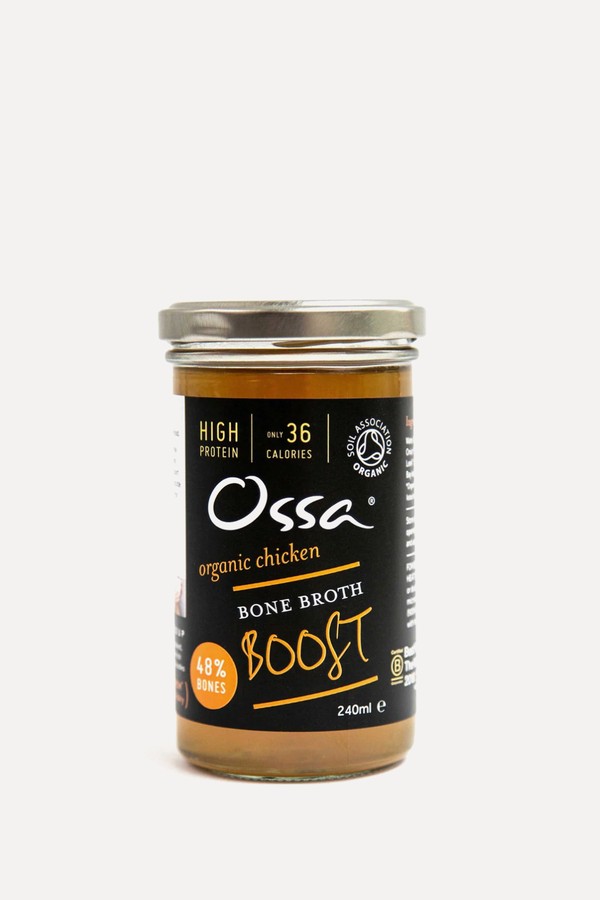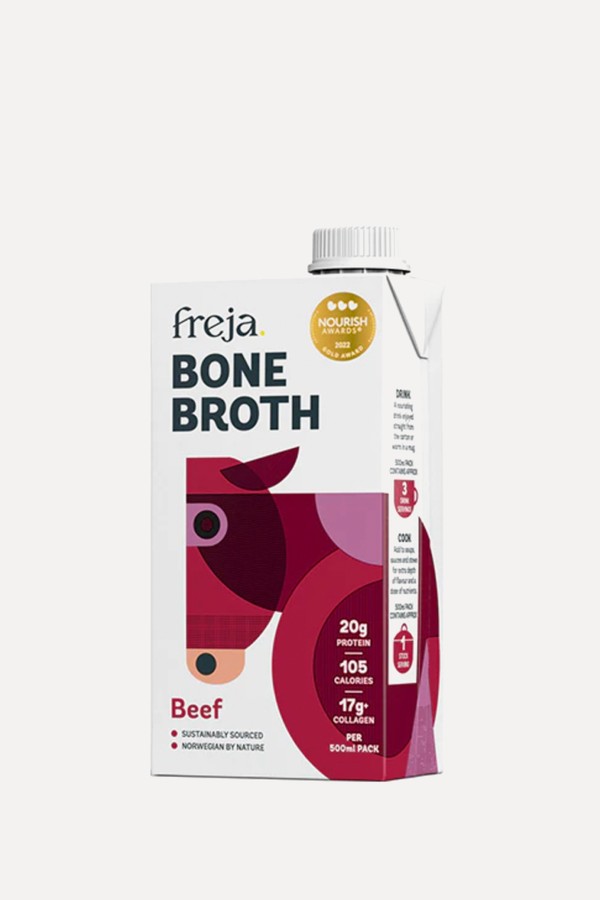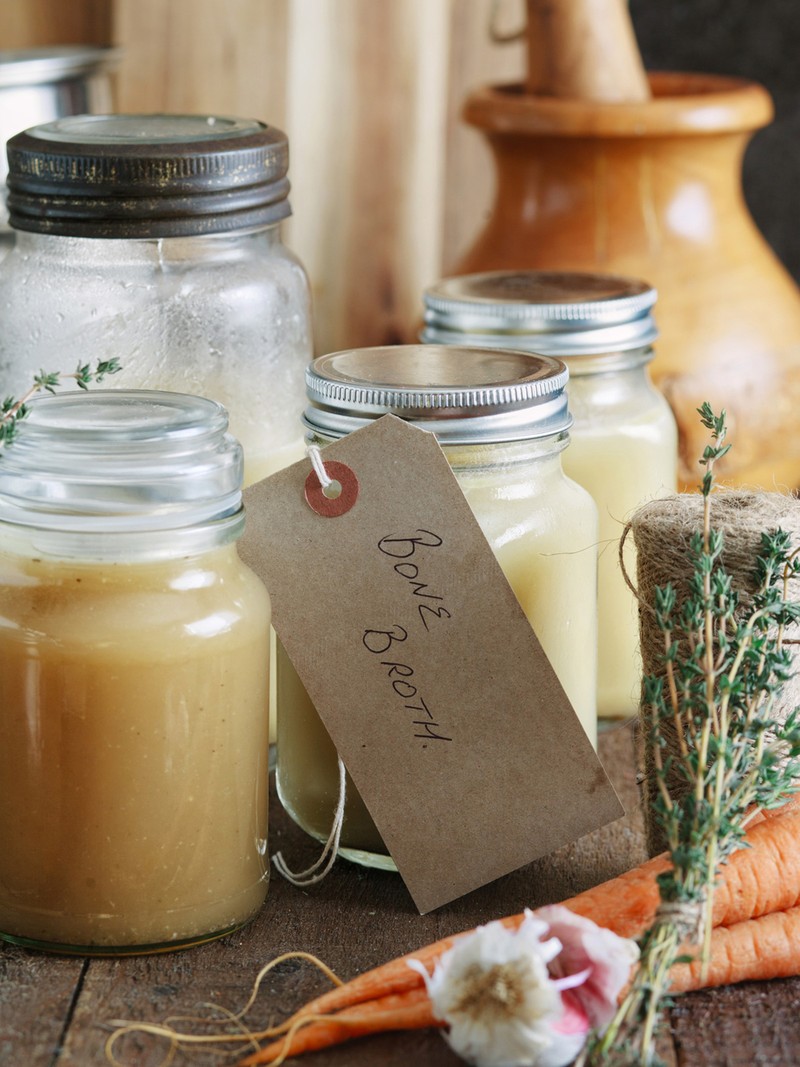Why Bone Broth Is The Ultimate Winter Superfood
THE BENIFITS...
Acts As Nature’s Multivitamin
“Bone broth – a stock made from boiling animal bones for several hours – is nothing new, but it deserves its reputation as a modern superfood. The slow cooking process releases vitamins and minerals from bones and connective tissue that our bodies are easily able to absorb, meaning maximum benefits. A simple way to pack more nutrients into your diet, bone broth is also a good source of restorative electrolytes like magnesium and potassium, which are more easily absorbed from broth than from supplements.” – Naomi Devlin, holistic chef & nutritionist
Contributes To Glowing Skin
“Bone broth is full of collagen, which contributes to skin elasticity, hydration and plumpness. Studies also show the collagen in bone broth can slow the skin’s ageing process and support hair growth.” – Reema Patel, private nutritionist at Dietitian Fit
Aids Restful Sleep
“Bone broth is rich in an amino acid called glycine, which plays a role in neurotransmitter function – these are the chemicals made in our brain that influence mood. Glycine is linked to GABA production, which is connected to improved mood, reduced stress and anxiety, and relaxation. This is why some people feel chilled and mellow after drinking bone broth in the evening. Glycine also supports a healthy circadian rhythm, meaning it can aid sleep.” – Ryan Carter, nutritionist at Live Vitae
Nourishes The Gut
“The collagen, gelatine and amino acids in bone broth can soothe the digestive system. Both collagen and gelatine are essentially the building blocks of your intestinal wall, and can help heal and repair damage. Bone broth is also a rich source of L-glutamine, an amino acid that’s been shown to support leaky gut, reduce inflammation in the digestive tract, and discourage bad bacteria from colonising on the intestinal wall.” – Kerry Beeson, nutritional therapist at Prep Kitchen
Keeps The Body Strong
“Glucosamine is often taken as a standalone supplement for joint health, but it’s also found in abundance in bone broth. Glucosamine is thought to prevent the breakdown of collagen and keep our cartilage – the tissue between our joints – strong. When boiled, the collagen in bones turns to gelatine and other amino acids, which form the building blocks of collagen and are easy for the body to utilise. Collagen derived from animal cartilage has been shown to be effective in helping pain and improving joint function – ideal for those who lead an active lifestyle.” – Kerry
Tops Up Protein
“Bone broth contains around 4g of protein per 100g, meaning a serving can contain 10g of protein or more. As we’re learning, we need more protein in our diet than we thought for better blood sugar balance, stronger muscles, better mood and healthier skin.” – Dominique Ludwig, nutritionist
HOW TO GET STARTED…
Think About Quality
“When cooked slowly and gently, nutrients in the bones and connective tissues dissolve into the cooking liquid, so quality matters – choose organic where possible. You can use animal or fish bones. Traditionally, meat bone broth would be made with the bones from just one animal, although pork bones are universal and mix well with others. Poultry and game bird bones also work well together. Butchers often sell bone boxes very cheaply, or look to online companies like Riverford Farm, Eversfield Organics, Pipers Farm and Laverstoke Park, which sell organic meat boxes.” – Naomi
Freeze Leftover Bones
“Freeze any bones left over from meals or cooking and make a big batch of broth when you have enough bones – there’s no need to defrost them either. Include any gristly bits and skin, either cooked or raw. Add a few stock vegetables for sweetness and flavour – a stick of celery, an onion minus the skin and a carrot or two, scrubbed and roughly chopped. Don’t add any salt until it’s finished, as the broth may be salty enough.” – Naomi
Be Patient
“Nutrient-dense bone broth takes time, so don’t rush it. Chicken bones need at least six hours, preferably 12, while all other bones need at least 12 hours, ideally 24. The longer you let it simmer, the more chance you give the nutrients to soak into the liquid. The bones should be soft and crumbly at the end.” – Dominique
Don’t Forget Lemon Juice
“Adding a little acid – either a splosh of wine or a tablespoon or two of vinegar or lemon juice – will help extract the minerals from the bones, making your broth more nutrient-dense.” – Naomi
Keep It Simple
“Avoid adding too many ingredients to your broth, as the long cooking time can make these flavours turn bitter and unpleasant. Do, however, think about roasting your bones in the oven first for 30 minutes or so to add more flavour. Also remember to skim your broth occasionally to remove any fat that arises to the surface and top up with water as needed. Once the broth is ready, strain and cool, before refrigerating for up to five days, or freezing for up to three months.” – Reema
Mix It Up
“If you don’t fancy drinking bone broth on its own, use it as a base for ramen, or add to homemade soup in place of stock. You can also use it as a liquid when making mashed potatoes – add the hot broth while mashing the potatoes, along with some butter and seasoning. If you like risotto, use bone broth in place of stock.” – Reema
Go Plant-Based
“Bone broth isn’t suitable for vegans or vegetarians due to the animal nature of the bones, but you can make a plant-based version by slowly simmering mushrooms, seaweed, miso paste, ginger and garlic, carrots, onion and herbs. This version of the broth will still provide many of the nutritional benefits that a bone broth provides, but will lack the collagen as there’s no vegan or vegetarian replacement for collagen.” – Reema
For more from the experts, visit NaomiDevlin.Substack.com, DominiqueLudwig.com, DietitianFit.co.uk, PrepKitchen.co.uk & LiveVitae.com
SHOP OUR FAVOURITES




DISCLAIMER: Features published by SheerLuxe are not intended to treat, diagnose, cure or prevent any disease. Always seek the advice of your GP or another qualified healthcare provider for any questions you have regarding a medical condition, and before undertaking any diet, exercise or other health-related programme.
DISCLAIMER: We endeavour to always credit the correct original source of every image we use. If you think a credit may be incorrect, please contact us at info@sheerluxe.com.


